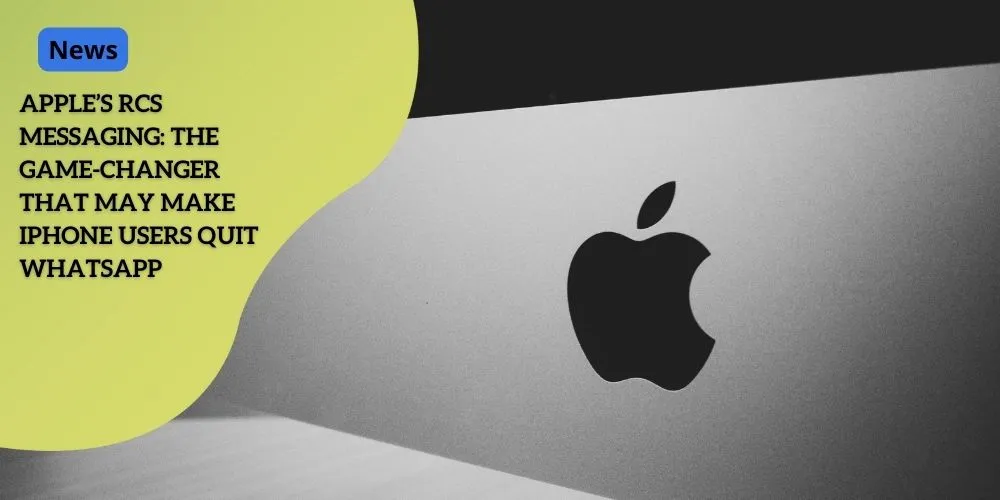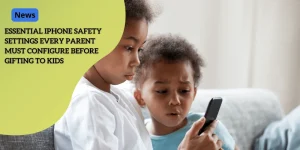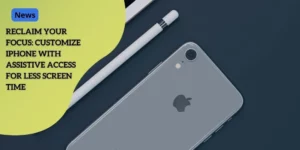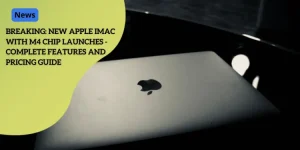Apple’s RCS Messaging: The Game-Changer That May Make iPhone Users Quit WhatsApp

Anúncios
Apple’s Embrace of RCS Messaging
On June 10th, Apple plans to make a major announcement: the support for Rich Communication Services (RCS) messaging on iPhones. This update is arriving sooner than expected, pushing forward from the original late 2024 timeline. The integration of RCS will enable iPhone users to enjoy enhanced messaging features when communicating with Android devices, a significant step towards improving cross-platform communication and overall user experience.
New Features for Cross-Platform Messaging
RCS introduces a suite of advanced messaging features that were previously unavailable when texting between iPhones and Android phones. These include location sharing, typing indicators, read receipts, and better media sharing—all of which aim to bridge the gap between the two platforms. This is a game-changer, particularly for users who often communicate with friends or colleagues using different operating systems.
Anúncios
Aiming to Improve User Experience
The main goal behind Apple’s embrace of RCS seems to be the enhancement of the overall messaging experience. By integrating these advanced features, Apple is making it less cumbersome for iPhone and Android users to stay connected. Not only does this improve the practical aspects of messaging, but it also addresses the user frustration that has lingered around the limitations of SMS, such as low media quality and the absence of read indicators.
As highlighted in Forbes, “With RCS, the gap between Android and iPhone users narrows significantly, making interactions more seamless.”
Implications for iMessage
While RCS introduces many enticing features, it doesn’t offer the same level of end-to-end encryption provided by iMessage and WhatsApp. iMessage’s security and integration with Apple devices will likely keep many iPhone users loyal, but the added functionalities of RCS could slow down the migration of users to other platforms like WhatsApp. This is a crucial point, as noted by Forbes, this evolution in messaging has the potential to reshape the mobile messaging landscape.
Anúncios
Enhancing Messaging Without Compromising Security
One caveat of this update is that, while RCS is more secure than SMS, it doesn’t match the end-to-end encryption levels of iMessage. As Forbes contributor David Phelan explains, “The blue bubbles already signify a more secure environment compared to green, and with RCS, these green bubbles will get a security upgrade, even if they don’t match the blue bubbles’ level.”
Conclusion
Apple’s early adoption of RCS is a strategic move aimed at enhancing cross-platform communication and addressing user frustrations. With improved messaging features between iPhones and Android devices, this update promises to enhance the user experience significantly. While the lack of end-to-end encryption in RCS may deter some users, the broader functionality and integration are likely to draw many back to iMessage, challenging the dominance of cross-platform apps like WhatsApp.
“`
RCS vs. iMessage: Functionality and Security
Enhanced Features with RCS
RCS is set to revolutionize cross-platform texting with features that go beyond traditional SMS. Among the highlights are:
- Location-sharing capabilities, making it easier to share your whereabouts.
- Typing indicators, so you know when someone is replying.
- Read receipts, confirming your message has been seen.
- Higher quality media sharing for photos and videos.
These enhancements are a significant upgrade from the old green bubble SMS experience and promise to make communicating between iPhone and Android users more seamless and interactive.
Security Comparisons: RCS vs. iMessage and WhatsApp
Despite these upgrades, RCS falls short in one critical area: security. Unlike iMessage and WhatsApp, which both offer end-to-end encryption, RCS does not. This lack of robust security could be a concern for users who prioritize their privacy. For the uninitiated, end-to-end encryption means that only the communicating users can read the messages, making third-party access impossible. iMessage’s strong encryption and seamless, exclusive features like editable texts and special message effects keep it ahead. In contrast, while RCS improves upon SMS security, it does not provide the full encryption that users of iMessage and WhatsApp enjoy.
iMessage Integration and User Loyalty
One of the significant advantages iMessage holds is its level of integration with Apple’s ecosystem. From syncing across all Apple devices to offering features like Apple Pay transactions within chats, iMessage does more than just send texts. This deep integration and feature superiority are a big reason why iPhone users remain loyal to iMessage, even with RCS in the mix. The exclusivity of the ‘blue bubbles’ also continues to hold a social appeal, something that may not be easily replicated by RCS.
Final Thoughts
While RCS is undoubtedly a step forward in bridging the gap between Android and iPhone communication, it has its limitations. The absence of end-to-end encryption is a notable drawback compared to iMessage and WhatsApp. Nevertheless, Apple’s integration of RCS is set to enrich the user experience without taking away the core benefits of iMessage. By bringing in advanced features to cross-platform communication, Apple is not only addressing technical gaps but also strategically positioning itself in the competitive messaging landscape. Ultimately, whether iPhone users will quit WhatsApp for iMessage hinges on how much they value security versus functionality and exclusivity.
The Potential Impact on Messaging App Landscape
Slowing the Migration to WhatsApp
The integration of RCS messaging on iPhones is set to be a huge game-changer. By introducing RCS, Apple is tackling one of the biggest pain points for iPhone users who frequently communicate with Android users—functionality. RCS brings features like location sharing, typing indicators, read receipts, and improved media sharing to the table, making cross-platform messaging more engaging and seamless. This can potentially slow down the steady migration of iPhone users to cross-platform apps like WhatsApp, because the need for a third-party solution to bridge this gap diminishes.
Regaining Lost Users
For many, WhatsApp’s platform-agnostic nature has been its biggest strength. Users globally have opted for it as a one-size-fits-all messaging app that operates seamlessly across different devices, including iPhone and Android. This has led to a noticeable shift in traffic from iMessage to WhatsApp. However, with RCS bridging the feature gap between iPhone and Android messaging, iMessage could potentially offer similar, if not superior, functionality. This makes a compelling case for users who previously switched to WhatsApp to reconsider iMessage, especially those who value the broader Apple ecosystem.
Reshaping the Competitive Landscape
This strategic move by Apple is likely to alter the competitive dynamics in mobile messaging. By enhancing its cross-platform capabilities with RCS, Apple is addressing not just user needs but also potential antitrust concerns. This move gives users a reason to stick with or return to Apple’s native messaging solutions, consolidating its position in the market. However, some premium features will likely remain exclusive to iMessage, ensuring that the ‘blue bubble’ retains its special status.
Implications for Other Messaging Platforms
Even though RCS provides many advanced features, it doesn’t offer the same level of security as iMessage or WhatsApp. This means that while RCS will make communication more fluid, some users who prioritize security might still prefer using iMessage or WhatsApp over RCS-based communication. However, for a vast majority of users who are more focused on functionality than encryption, RCS provides a robust alternative.
Final Thoughts
As RCS rolls out on June 10, Apple is poised to redefine its messaging strategy, making iPhone users less dependent on apps like WhatsApp for cross-platform communication. With features that make texting between iPhone and Android users more pleasant, Apple is taking a significant step in maintaining its dominance in the messaging sector while simultaneously enriching the user experience. Whether or not this transformation will revolutionize mobile messaging entirely remains to be seen, but it’s clear that the integration of RCS is a key move in Apple’s ongoing strategy.
Addressing Antitrust Concerns and User Preferences
Antitrust Concerns
Apple’s integration of RCS messaging on iPhones brings a strategic edge in addressing antitrust concerns raised by the Department of Justice. By enhancing cross-platform communication, Apple can argue that it fosters greater interoperability between iPhones and Android devices. This move helps to counter criticisms that Apple’s ecosystem is overly closed off, thereby reducing regulatory pressure associated with monopolistic practices. In recent years, Apple has been scrutinized for maintaining its “walled garden,” which refers to its tightly controlled ecosystem. By incorporating RCS, Apple effectively demonstrates an effort to cultivate a more inclusive messaging environment, which could help in mitigating some of the antitrust scrutiny it’s currently facing. This change is expected to make the iOS ecosystem appear less exclusive, promoting the notion that Apple is committed to fair competition and accessibility.
User Preferences and the ‘Blue Bubble’ Phenomenon
Despite these regulatory benefits, Apple is also mindful of user preferences, particularly the loyalty of iMessage users who cherish its exclusive features. The ‘blue bubbles’ in iMessage have become a status symbol among users, signifying a premium messaging experience that includes features like end-to-end encryption, message effects, and seamless integration with other Apple services. Some users may hesitate to fully embrace RCS due to its lack of end-to-end encryption, a feature that aligns closely with Apple’s commitment to user privacy. Nonetheless, the implementation of RCS offers a middle ground, significantly enhancing the security of green bubble messages by improving upon the outdated SMS standard, even if it doesn’t match the security level of iMessage. This provides a competitive edge while maintaining core iMessage functionalities, which are often cited as reasons for iPhone user loyalty
Exclusive Features and Future Prospects
It’s worth noting that some premium features will remain exclusive to iMessage, ensuring that Apple retains its high-value customer base. Features like editing or unsending texts, which are unique to iMessage, will not extend to RCS messaging. Likewise, Google Messages may keep certain functionalities exclusive, such as text drafting via the Gemini AI model. Furthermore, the visual distinction between blue and green bubbles will persist, signaling whether a message is sent via iMessage or RCS.






